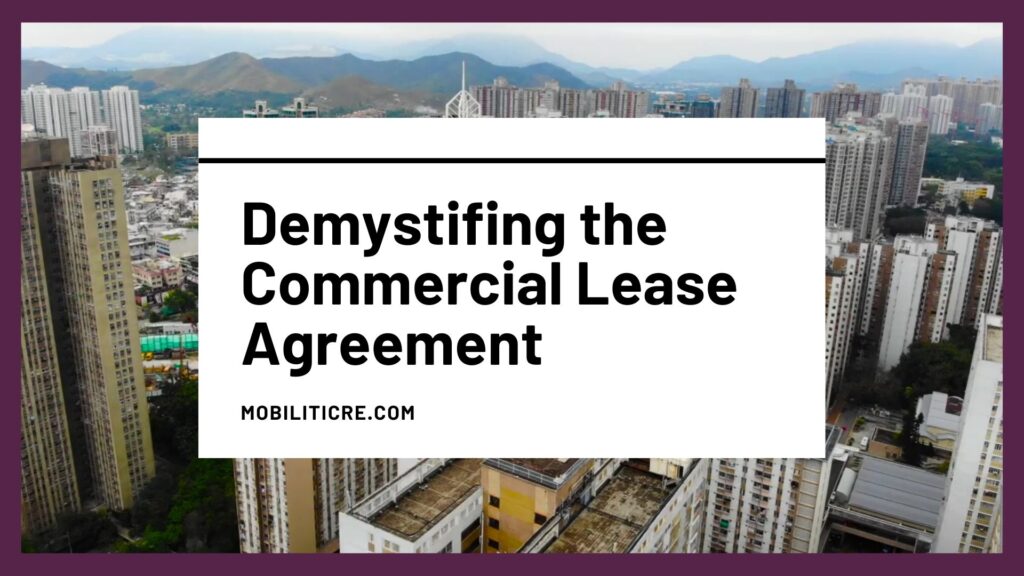Demystifying Commercial Lease Agreement: What Tenants Should Look For
Signing a commercial lease agreement is a big step for any company. It’s a commitment that can have a significant influence on the economics and operations of your organization. As a result, tenants must thoroughly comprehend the lease’s terms and conditions before signing anything. We will deconstruct commercial lease agreements and highlight what tenants should look for to achieve a successful and mutually beneficial leasing experience in this article.
Structure of Rent
The rent structure is one of the most important factors to consider in a commercial leasing arrangement. Tenants must be aware of how rent is determined and any potential adjustments during the lease term. The following are examples of common rent structures:
In a gross lease, the tenant pays a fixed monthly rent while the landlord covers running expenditures such as utilities, property taxes, and maintenance. This provides monthly expenses that are predictable.
A net lease requires the tenant to pay a percentage of the operational expenditures, which may include property taxes, insurance, and upkeep. It is critical to understand the expenses you will be liable for and to budget properly.
A percentage lease, which is common in retail premises, entails paying a base rent plus a portion of your sales earnings. Understanding the percentage and how it is calculated is critical in this scenario.
Lease Period
Another critical consideration is the length of the lease. When negotiating lease terms, tenants should consider their company’s long-term ambitions and stability. Lease terms that are commonly used include:
- Short-term leases: These can be as short as one year and give flexibility, although the rent may be higher.
- Long-term Leases: Longer leases, often of five years or more, can give stability and potential rent discounts, but they require a larger commitment.
Check that the lease period corresponds to your business strategies and growth expectations.
Options for Renewal
Tenants should be aware of their options for renewal. These provisions allow you to extend your lease if necessary, usually at a predetermined fee. Understanding the renewal terms and conditions will help you avoid last-minute surprises and ensure that your business can continue to operate from the same site if necessary.
Tenant Improvements
Tenants who lease commercial space frequently need to make alterations to customize the leased premises to their business needs. Determine who is responsible for these upgrades and the expenditures connected with them. Tenant improvement (TI) allowances can sometimes cover all expenses or at least offset some expenses, but these terms must be negotiated in advance.
Maintenance and Repair Responsibilities
Understanding your maintenance and repair obligations is critical. In some circumstances, the landlord may cover these expenses, while in others, the tenant is responsible. It’s important to define what constitutes typical wear and tear versus the tenant’s duty to cover repairs for damages.
Expenses for Operations
Net leases typically require tenants to pay for all operational expenses associated with the building such as utilities, property taxes and insurance. It is critical to comprehend which costs are included, how they are computed, and how they may change over time. This information enables you to efficiently budget and forecast increases in expenses.
Termination Clauses and Exit Strategy
Life is unpredictable, and business situations can shift. Termination clauses are typically heavily negotiated, and they are never free. Tenants are typically required to reimburse the landlord for the unamortized cost of tenant improvements and commissions. Understanding your departure alternatives can rescue you from financial hardship.
Rights to Sublease and Assignment
Businesses may need to sublet or assign their leased space to another party in some instances. Tenants should be aware of the terms and conditions governing subleasing and assignment rights. This is especially critical in the event of a serious downturn in business.
Conclusion
Any tenant hoping to acquire a suitable space for their business should ideally engage an attorney and a commercial real estate broker to help them decipher commercial lease agreements and negotiate the best terms possible. Tenants can make informed decisions that match their business goals and financial capabilities by paying special attention to rent structure, lease duration, renewal options, tenant improvements, responsibility for maintenance, operating expenses, exit plans, and subleasing rights. Consulting with legal and real estate professionals can also be extremely important in ensuring that your lease arrangement is fair, clear, and optimal for your company. Remember that a well-negotiated lease can be a valuable asset to the success of your organization.
At Mobiliti CRE we focus 100% on representing tenants with relocations, expansions, contractions, and subleases throughout Tampa Bay and the entire West Coast of Florida. We also assist businesses that are looking to purchase office, medical office, flex and industrial Reach out to us for assistance with all of your commercial real estate needs at (813)-300-2227 or email us at pam@mobiliticre.com

